Black men are poised to take Trump to the White House. Biden insiders are worried

In February, on the eve of the South Carolina primary, former president Donald Trump spoke before the Black Conservative Federation in the Palmetto State’s capital city of Columbia. There, he tried to link his own legal battles with the plight of Black men who have been unfairly discriminated against in the US.
“I got indicted a second time, and a third time, and a fourth time,” he told the audience. “And lot of people said that’s why the Black people like me – because they have been hurt so badly and discriminated against and they actually view me as I’m being discriminated against.”
The twice-impeached, four-times-indicted former president’s remarks were equal parts clumsy and revealing: Trump has long seen an opening to improve his standing with African American voters, especially Black men. It’s why, despite his often harsh rhetoric about “law and order,” he signed on to bipartisan efforts to reform the criminal justice system during his presidency.
Although he and his advisers boasted during his 2020 re-election bid that upwards of a fifth of Black men would vote for him, Trump lost Black voters to Joe Biden by significant margins when Americans went to the polls four years ago. Yet Biden has struggled to keep that key demographic in the fold during his time in the White House.
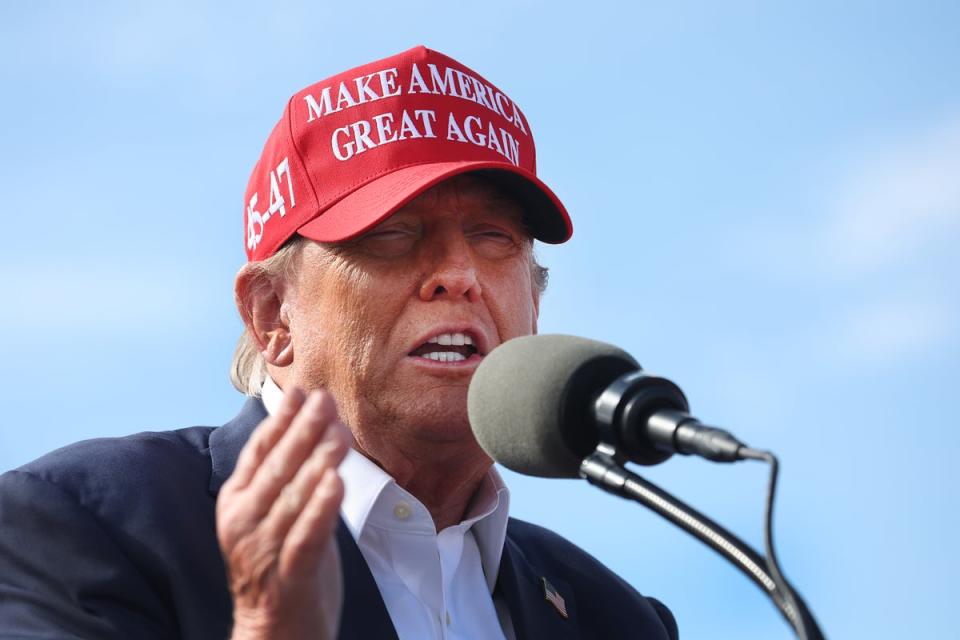
In his victory speech in November 2020, Biden specifically thanked Black voters and pledged: “You’ve always had my back, and I’ll have yours”. He had largely won the Democratic nomination thanks to support from Black voters in states below the Mason-Dixon line, after all. But in the years since, his presidency has not been able to deliver on many of the major pledges he promised, namely in police reform and voting rights. Both efforts died in Congress – largely because of Republican opposition, but many voters still remain dissatisfied.
This time around, a small but not insignificant gender gap between Black men and women appears to have opened further: Black men now lean significantly more conservative than their female counterparts. That fact allows Republicans to chip away at the margins of what was once a solid Democratic base.
A recent Gallup survey showed that Democrats’ lead with Black voters has eroded by 20 points in the last three years. And earlier this month, a New York Times/Siena College poll showed that 23 per cent of Black voters said if the election were held today, they would vote for Trump. If that were to be true, it would be a staggering 10 per cent jump from the 13 per cent of Black voters who voted Trump in 2020.
Trump’s confidantes claim he can garner support from as many as half of Black voters this year. That might seem overly optimistic, but it would continue a trend of Democrats’ margins steadily decreasing among Black men. NBC News exit polls showed that in 2008, 95 per cent of Black male voters voted for Barack Obama. That number went down to 80 per cent for Biden in 2020.
Moreover, the Times/Siena survey showed that only 47 per cent of non-white voters without a college degree would support Biden versus 41 per cent for Trump. That echoes a firm educational polarisation playing out among the broader electorate across the US.
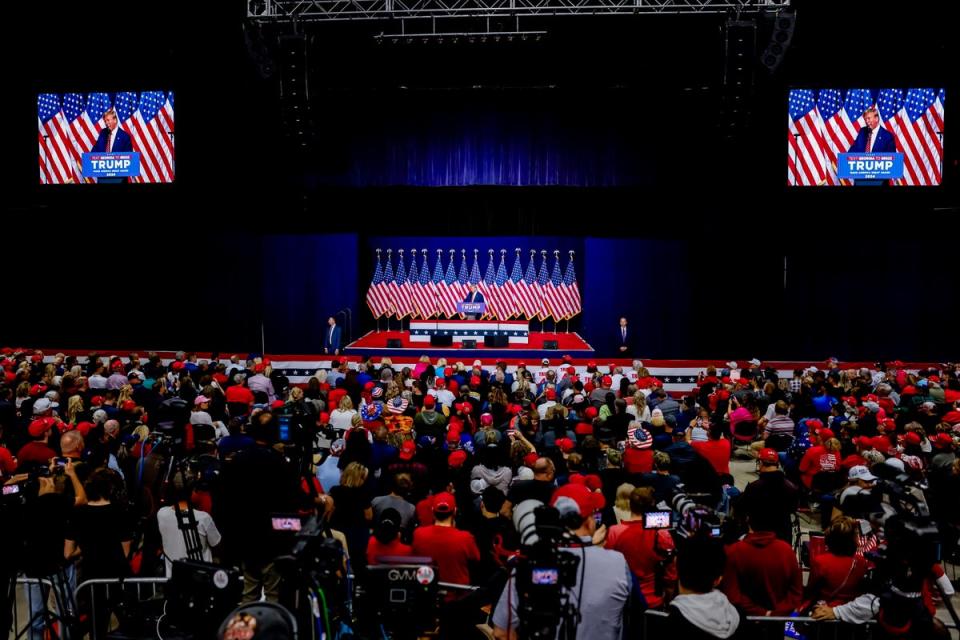
With that in mind, Republicans have made more of an effort to have Black male faces on the campaign trail and in conservative spaces. Representative Byron Donalds of Florida has emerged as one of Trump’s most vocal surrogates, campaigning for the former president in Iowa and speaking in support of him at the Conservative Political Action Conference (CPAC).
“Black men are starting to think through their politics and not just party,” Donalds told The Independent. “I think for Black men in particular, [they like that] Trump just says what he thinks. He’s not worried about what people say about him.”
Donalds added that another aspect of Trump’s persona also appeals to Black men: “I mean, his heart at his core, he’s a hustler, man. So it’s hustling and working hard and grinding and trying to just make money and build empires and build that stuff. You know, I don’t think it’s a Black male thing. I think men in general like that and follow that.”
Donalds pointed to the fact that prior to his election, Trump was an icon who was frequently name-checked in rap songs. In 2020, Trump attempted to parlay that cultural cache by appearing with rappers such as Ice Cube and Lil’ Wayne. He’s appeared at Ultimate Fighting Championship (UFC) events in the past and UFC company president Dana White openly supports him.
To outward appearances, the Biden campaign doesn’t seem concerned enough about what could be a quiet but seismic shift among Black men, despite the fact that it would make it that much more difficult for the president – or any Democrat – to eke out even the narrowest electoral college victory in November.
But Biden campaign officials refute that. They speak encouragingly about the use of high-profile Black surrogates such as Florida representative Maxwell Frost, the youngest (and only Gen Z) member of Congress, and representative James Clyburn, the longtime Democratic House leader whose endorsement catapulted Biden to victory in South Carolina four years ago. They also mention the increasing involvement of vice president Kamala Harris on the campaign trail.
One Biden-Harris official who spoke to The Independent also pointed to the campaign’s recent $25m ad campaign, which they described as “the largest and earliest investment in Black media for a re-election campaign in history”, as well as a recent Atlanta campaign event showcasing Black surrogates and “Black support for the Biden-Harris administration at large”.
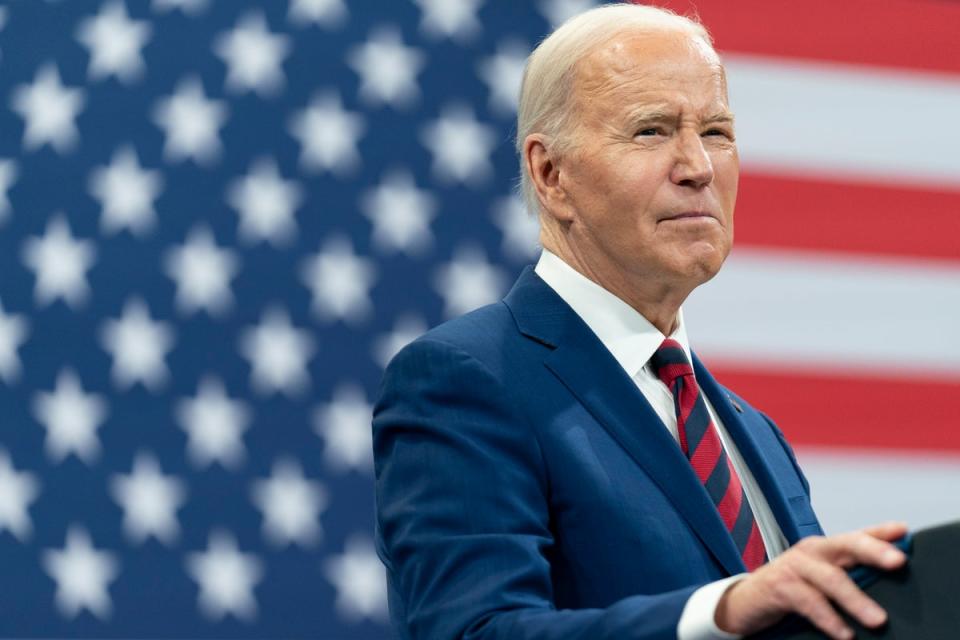
“These efforts are all a result of our campaign understanding that we cannot take a single vote for granted. We cannot take Black voters for granted. And we are working to earn their vote with substantial and early investments and reaching them where they’re at and being creative with that. And [we want] to make sure that they’re aware of all of the promises made and kept by the President and the Vice President,” the official said.
Yet at the same time, Biden campaign sources didn’t appear to have clear answers on how the campaign – or the Democratic ecosystem – has prepared to counter Trump’s status as a cultural meme. Nor do they seem to know exactly how to counter the waves of disinformation that will be targeted specifically at Black voters, either from the Trump campaign, its allies, or foreign actors intent on helping the ex-president become the president-elect once more.
In one infamous example from 2016, pro-Trump influencer Douglass Mackey conspired with other extremely online Trump supporters on X (formerly known as Twitter) to trick Black voters into casting fake text-message ballots for then-Democratic nominee Hillary Clinton instead of actual ballots on election day. He is currently fighting a seven-month prison sentence for conspiracy against the right to vote.
Another similar incident took place four years later when pro-Trump troll and fraudster Jacob Wohl worked with ex-lobbyist Jack Burkman on a robocall (automated phone call) campaign designed to dissuade Black voters from voting for Biden.
Foreign governments have also sought to exploit Black voters in their own interference efforts, such as when Russian trolls with the Kremlin-backed Internet Research Agency used a fake Facebook account called “Blacktivist” to dissuade Black voters from voting for Ms Clinton.
When pressed specifically on how the 2024 team plans to blunt the impact from such inevitable disinformation operations, a Biden campaign official said the “biggest thing” is “making sure that the correct information is out there” and “using ... the resources that we have to make sure that our message is reaching folks far and wide and ... ensuring that folks understand all of the promises made and kept by the administration and what the successes that we've actually been able to accomplish ...for Black Americans specifically”.
One prominent Black Republican, former Maryland lieutenant governor Michael Steele, expressed dismay when told about the Biden campaign’s lack of specificity for countering Trumpworld mischief aimed at depressing Black turnout.
Steele, who served as chairman of the Republican National Committee from 2009 to 2011, told The Independent that it’s clear the Biden campaign thinks it can simply continue to deploy the same tactics Democrats used against Republicans before Trump.
“Not only has the political climate changed, but the political rhetoric has become more harsh and more brutal... Voters’ attitudes have changed,” he told The Independent.
Steele, who was the first Black chair of a major political party and attempted to grow the GOP’s reach with African Americans, said voters have missed Biden’s accomplishments because of poor messaging from the White House. Meanwhile, Trump benefits by simply showing up at Sneaker Con to promote his new gold sneakers and talk about protecting Black men’s right to smoke menthol cigarettes.
“That’s a winning argument, and that’s their problem,” Steele said of the Democrats.
At the same time, he emphasised that despite the rightward drift of Black male voters, he doesn’t believe Trump has actively sought them out. He believes that Trump’s relative lack of political achievements mean he has a clean slate with a lot of voters when Biden doesn’t. But that won’t translate to advantages for Black men if they vote the former president in.
“Donald Trump has never done the work – so it’s easy to put someone up and talk about them being in a rap video,” he said. “He becomes this cultural phenomenon that’s connected to nothing politically. [But] he can’t get legislation passed. He can’t get policy implemented. Because he doesn’t know how.”
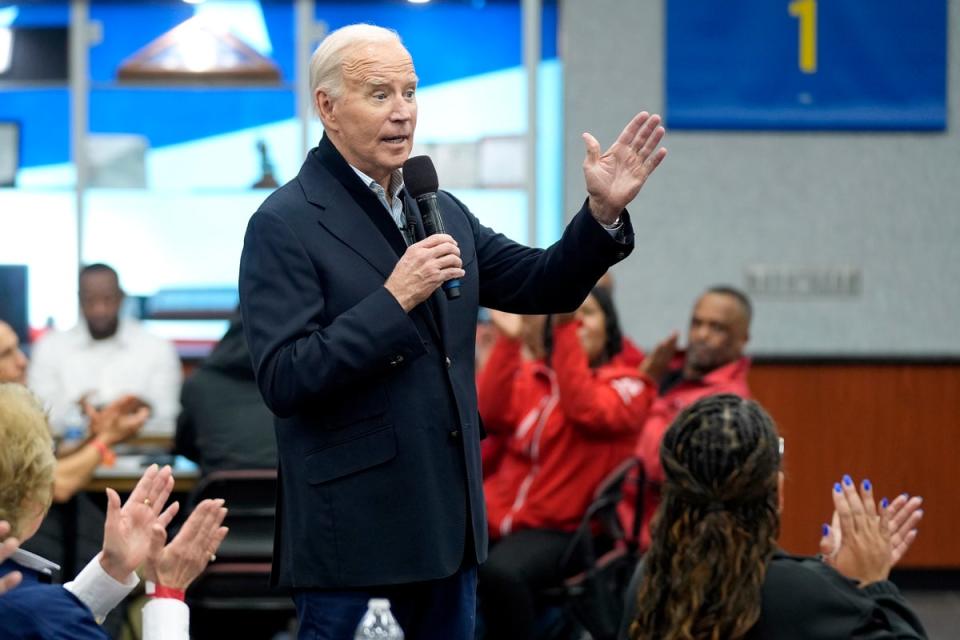
Many Black Democratic strategists cast doubt on Biden’s supposed misfortune in the polls. Cliff Albright, the co-founder of the Black Voters Matter Fund, said that the campaign has not begun in earnest.
“ We’re in March, we’re eight months away,” he said. “At least on Biden’s side, some of that outreach is only now just getting started.”
Albright said that Biden’s campaign began doing Black voter outreach much earlier than previous Democratic campaigns. At the same time, he cautioned, there are logistical issues around the election to do with basic voting rights. The difficulty in voting in some states affects Black voter turnout.
Joshua Doss, the senior research manager at HIT Strategies, told The Independent that a pro-Trump super PAC poured in $380,000 worth of ads to target Black voters as a response to encouraging polls. But the buys are merely symbolic, he added.
“I think it’s symbolic because I think that the Trump administration doesn’t really have plans on actually communicating to Black voters intensively throughout the duration of his campaign, or maybe even legislating for Black voters when he’s in office, potentially,” he said. “But I think that it’s a nice little tip of the hat, like: ‘Hey, we care about Black people, here’s some noise about trans bathrooms and stimulus checks and stuff’.”
Conversely, All* Above All Action Fund, an abortion rights advocacy group, commissioned a poll ahead of Super Tuesday which found that nine in 10 Black men support abortion rights and that more than half of Black men say a candidate’s position on abortion matters to them. Nourbese Flint, the president of the organisation, said it was important for abortion advocates to “make sure that we’re getting [our message] to those folks”.
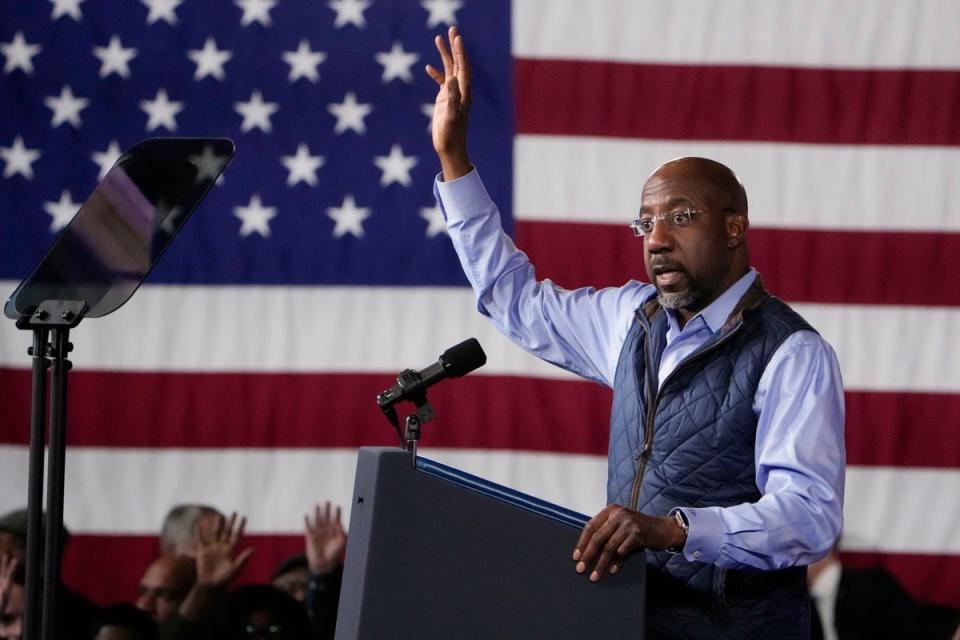
“It’s just up to us at this point to make sure that we are doubling down on our voters and not taking them for granted, and particularly doubling down on the Black community,” she told The Independent. “It’s always talked about as being a solid Democratic vote. But that doesn’t mean that we still don’t need folks to take care, to honour that relationship.”
On Tuesday, Biden campaign manager Julie Chavez Rodriguez highlighted the campaign’s outreach efforts to voters in the South. Those efforts include running ads during homecomings for historically Black colleges and universities and during games for the University of Georgia. Additionally, senator Raphael Warnock, of Georgia, who preaches at the Ebenezer Baptist Church where Martin Luther King once preached, has been seen campaigning alongside Biden.
“I don’t think that came for no reason,” Doss, the senior research manager at HIT Strategies, said of the ad campaign targeting Black and Latino voters, which reportedly cost $30m. “I think it’s a response to the polls.”
Representative Steven Horsford of Nevada, the chairman of the Congressional Black Caucus, campaigned recently with Biden in Nevada. “Black male voters care about the same issues around economic opportunities; creating economic prosperity through entrepreneurship; home equity, which creates wealth and generational legacy; and making sure that we have safe communities like every other community,” he said, when asked about his strategy.
Yet a recent poll commissioned by HIT Strategies and shared with The Independent shows that 73 per cent of Black voters say that their lives have not improved since Biden took office. Worryingly for the president, 28 per cent of Black voters who are younger than 50 say life has gotten worse.
“Those type of things are alarming,” Doss said, “when you are running for president on the side of politics that has historically garnered pretty much an unsustainable level of support from Black voters.”
